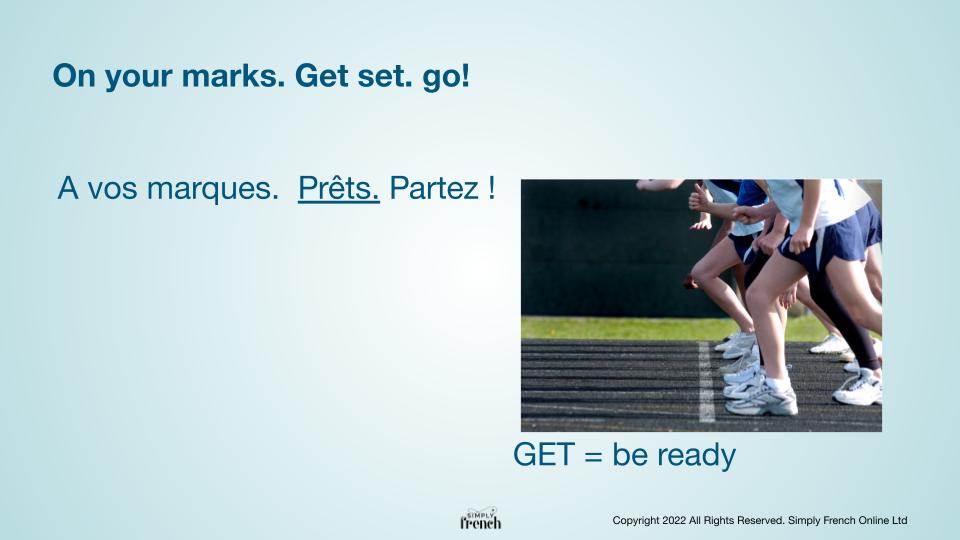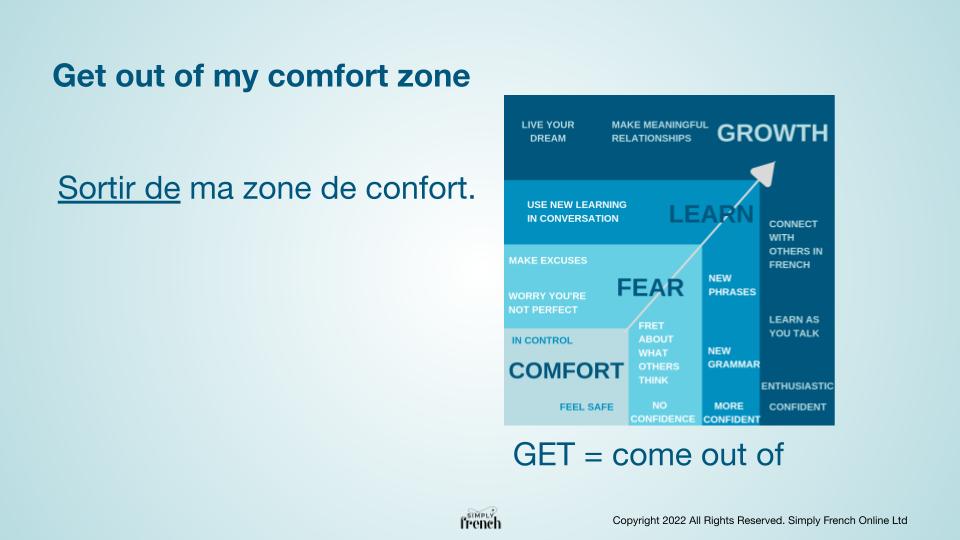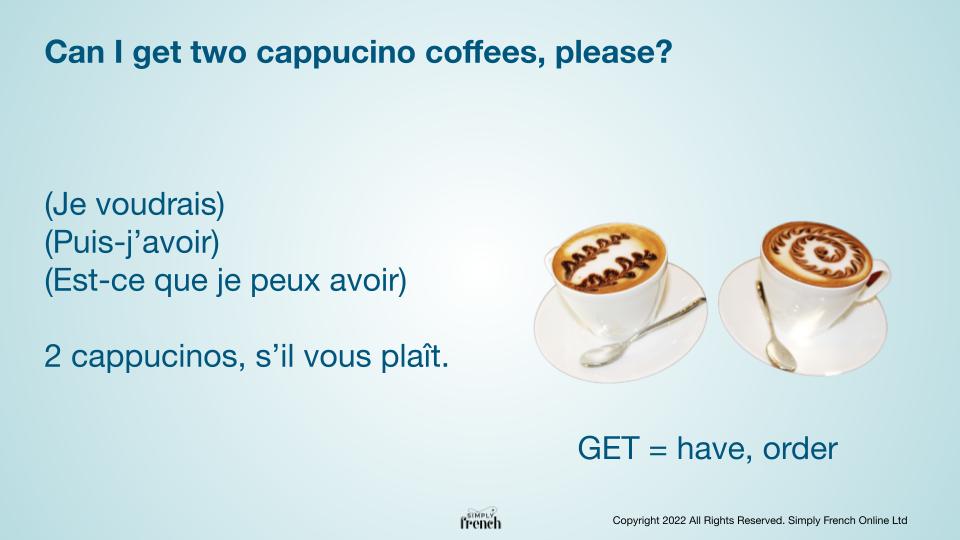10 Different Ways to Translate TO GET in French
Apr 12, 2022Bonjour!
There are some useful verbs that are really general and have loads of meanings. It’s exactly the case of the English verb : “to get”. It's not a work that you can really translate on its own.
So, here are 10 ways to translate this 'get' in French so we can 'get' specific. Try to work out the sentences yourself before you look at what I have to offer in terms of translation for these examples.
Let’s dive in.

Different ways of using GET
Have you ever wondered about how easy it is to say and write “get” for anything?
Indeed, i's just about everywhere. It gets itself about! I put together a list of possible meanings - I'm sure you'll get to find more somewhere, but you get the point!
- obtain
- find
- secure
- make
- have
- hold
- possess
- locate
- discover
- understand
- become
- receive
- grow… it seems never ending!

Let's tuck into some work now - look at the picture below and try to find a synonym of each “get”. We don't normally pay attention to the proper verb, to be honest. And we wouldn't sound natural anyway if we spoke any other way.

Have you found a suitable match for each phrase here?
Here's my offering:
get >>> fetch
get >>> be ready
get >>> to be
get >>> exit
get >>> someone else doing the action
get >>> start
get >>> marry
get >>> obtain / receive
get >>> have
get >>> understand

How to translate "get" in French
Let's see how it works the French way round.
First, “get” in the sense of “fetch” is “chercher” in French. Examples:
- Je vais chercher ma veste >>> I’m going to get my jacket.
- Tu peux aller chercher des assiettes s’il te plait ? >>> Can you fetch some plates please?

This expression is very specific since it’s only in the context of a race or game. And this expression is:
- À vos marques. Prêts. Partez! >>> On your marks. Get set. Go!

In English there are plenty of collocations with “get” like: get a cold, get angry, get drunk…
“Get” also goes with some prepositions in order to form phrasal verbs such as “get in”, “get out”, “get over”, “get on”, “get back”, “get away”... For our beloved French learners of English it really must be quite a nightmare!
And the expression “get stuck” in French is “être / se retrouver coincé / bloqué”. The first one is less formal. However, you can simply use the verb “to be” which is “être” in French.
- J’étais (coincé / bloqué) dans un bouchon >>> I got stuck in traffic.

Very often in English, we have a generic verb and by adding a preposition, the meaning changes: get in, get out, get away, get around, get along… We are not usually aware we are doing this, though.
In the case of “get out”, we can use "Sortir" de ma zone de confort >>> Get out of my comfort zone.

This phrase is a bit more specific in English. When someone does something for you like washing or fixing your car, cutting your hair, cleaning your house etc, we have a unique pattern in English with "to get" and the past participle.
We have the same in French with “faire faire” or “faire” and the infinitive.
- Je me suis fait couper les cheveux aujourd’hui >>> I got my hair cut today.

Here, in English, it doesn’t mean he has obtained a job but the fact he has started which explains the translation in French:
- Mon fils vient d’être embauché >>> My son just got a new job.

Remember idiomatic expressions? In English, we can find them in many contexts:
- get hungry
- get angry
- get married
- get up
- get dressed…
So, we usually say “get married” when we can also say “to marry” and avoid this vague “get”. I still can't help thinking how hard this minefield is for the French when they want to speak English.
- Nous nous sommes mariés en 2020 >>> We got married in 2020.

Another meaning of “get” is “to obtain”. This is far more specific because there’s the idea of effort behind it like here:
- Mon chien a gagné la note la plus élevée de son groupe au centre d’éducation >>> My dog got top marks in his training class.

Time for coffee now? It's certainly well deserved!
With this use of “get”, it can be confusing: does it mean to fetch as well or simply order? That’s another reason why we should pick “have” instead of “get”.
- Est-ce que je peux avoir 2 cappuccinos, s’il vous plait ? >>> Can I get two cappucino coffees, please ?

And now - in the last one, it’s a matter of concrete and abstract sense. Indeed, “get” doesn’t mean physically but mentally, with the idea of understanding.
- Tu me comprends? >>> Do you get me?

10 different ways to translate To Get in French
So, we have seen that if we don’t pay attention in English, we could have “get” everywhere because it’s a generic verb. The French language prefers to be more specific and requires a different verb for each context.
I advise you to say what you mean without using the word"get" and see what you come up with. It certainly would make a great game, like the 'yes/no' game!
Here’s a list of possible ideas:
- obtain >>> obtenir
- find >>> trouver
- secure >>> attacher
- make >>> faire
- have >>> avoir
- hold >>> tenir
- possess >>> posséder
- locate >>> localiser, trouver
- discover >>> découvrir
- understand >>> comprendre
- become >>> devenir
- receive >>> recevoir
- grow… >>> grandir, pousser
So, analyse the context and choose the best French equivalent.
Are there any that seem more complicated for you to use in French? Why?
I'm listening!
Free Masterclass
Learn my 4 step method of how to hold meaningful french conversations the R.E.A.L. way in just 30 minutes a day.
When you signup, we'll be sending you weekly emails with additional free content

